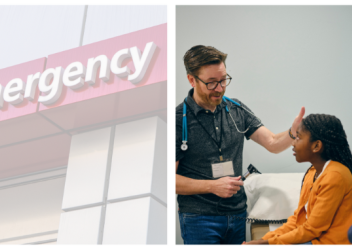Reducing Disparities in Concussion Care
The Minds Matter Concussion Program at Children's Hospital of Philadelphia is committed to reducing concussion disparities often seen in pediatric care. Our work in this area aims to identify and address barriers to high-quality and equitable concussion care across key socio-demographic groups.
A sizable proportion (30%) of pediatric concussion patients experience long-lasting symptoms for months to even years. Prompt access to concussion care specialists can accelerate recovery and improve overall outcomes. Yet access to specialized care is not equally distributed among all concussion patients, especially those experiencing socioeconomic disadvantages.
- Characteristics of Pediatric Concussion Among Age Groups More
Minds Matter researchers found that children between the ages of 5 and 12 more frequently experienced a concussion from recreation-related settings, or settings outside of both sport and recreation, when compared with sport settings. The study is the first to separate sport and recreation-related concussion in young children and highlights the need for additional investigation into this under-evaluated age group. The research seeks to inform policy on providing education and up-to-date information for anyone who a child with concussion in this age group may first present to, such as emergency departments, primary care clinicians and schools nurses, when the injury occurs outside of sports.
- Investigating Concussion Care Disparities in Primary Care
With a four-year grant from the Centers for Disease Control and Prevention (CDC), Minds Matter Researchers are identifying disparities in concussion outcomes through 1.) review of the Minds Matter Concussion Registry (an electronic health record-based census of those seen for concussion with the CHOP network) and school re-entry data from BrainSTEPS (a program overseen by the Pennsylvania Departments of Health and Education), 2.) evaluating implementation of primary care-based interventions in urban and suburban practices, and 3.) partnering with urban youth-serving schools and sports programs to improve education and access to concussion care.
Published Research
Healthcare Point of Entry for Pediatric Concussion
Among 15,631 patients (age 0-18) included in the study, Minds Matter researchers found significant differences between the emergency department, primary care, and specialty care settings when analyzing age, race, insurance status, and the Child Opportunity Index, a composite score of 44 indicators critical to the health and development of children at the neighborhood level. The study highlights the importance of providing concussion training and education for emergency department providers and a need for up-to-date community-level resources that can support pediatric patients at high risk of experiencing inequities in care.
Minds Matter Co-Director Dr. Christina Master and Associate Director Dr. Daniel Corwin discuss the implications of this research for emergency departments and the community:
Study Objectives
The objectives of this implementation study are to determine the effectiveness of interventions at the primary care, school, and sport-levels to improve concussion outcomes for all youth and reduce disparities in those outcomes by addressing barriers for both patients and providers in the access and provision of high-quality, equitable care. Innovative mobile health-based strategies to facilitate care continuity will also be evaluated.
Investigational Plan
This project is pursuing the following aims:
- Identify disparities in concussion outcomes by utilizing CHOP’s Minds Matter Concussion registry and Pennsylvania school re-entry data from the BrainSTEPS program.
- Enhance pediatric concussion care at the Primary Care point of entry by implementing an intervention embedding two tools in the electronic health record for accurate concussion diagnosis/management and risk stratification for specialist referral. The impact of this intervention will be compared between urban and suburban primary care practices within the CHOP network.
- Facilitate referral to specialty concussion care for those at higher risk for delayed recovery by connecting those patients to a nurse navigator that will enhance care handoff from primary to specialty care.
- Improve access to concussion care for urban youth by partnering with schools and sports organizations and implementing educational training with personnel.
Principal Investigators: Kristy Arbogast, PhD and Christina Master, MD
Partners: University of Pennsylvania (School of Nursing, Wharton School), BrainSTEPS Program, Philadelphia Youth Sport Collaborative
Funding: Centers for Disease Control and Prevention
- Improving Access to Treatment for Head Injuries More
In order to address gaps in care and improve health outcomes for all youth with a concussion, the Minds Matter team has been exploring how to translate and implement its evidenced-based concussion care model in multiple different inpatient and outpatient clinical settings, as well as schools, beyond the CHOP health system and community.
- Addressing Disparities Through Concussion EducationMore
Youth participating in public middle or high school athletics were asked to complete a survey regarding their knowledge, attitudes, and perceptions of concussion before and after receiving concussion education. Minds Matter researchers found that while education had a positive impact, disparities existed before and after the education in schools where a lower Child Opportunity Index was recorded - indicating a need for more equitable educational support systems.
- Foundational Research
Disparities in Adherence to Concussion Clinical Care Recommendations in a Pediatric Population
In a retrospective medical record review of patients aged 5 to 18 years old who presented to Primary Care over a 6-month period in 2019 (n=755), researchers confirmed disparities in follow-up concussion care completion, particularly among pediatric patients who are publicly insured and identify as non-Hispanic Black. This study highlights disparities in adherence to concussion care recommendations that could impact recovery trajectories. This study was funded, in part, by the CHOP Center for Pediatric Clinical Effectiveness (now known as Clinical Futures).
Read the CHOP Press Release.
Assault-Related Concussion in a Pediatric Population
This study compared demographic characteristics, medical care, and outcomes among patients with assault-related concussions (ARC) versus sports and recreation–related concussions (SRC). Patients with ARC were less likely to receive a concussion-specific diagnostic evaluation and reported a greater impact on educational outcomes. The findings highlight disparities indicating further needs to examine care and outcomes for youth with ARC.









